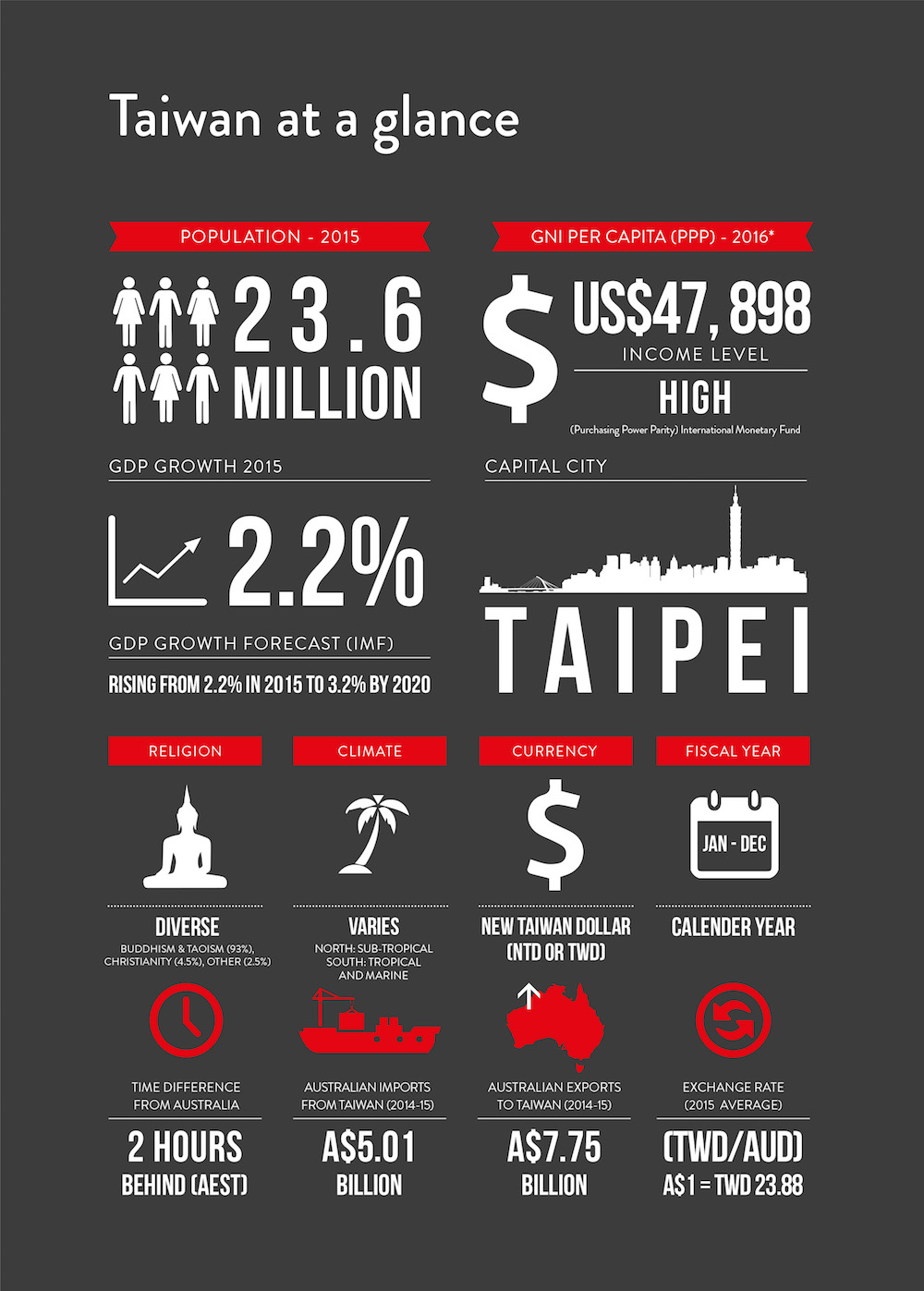Doing Business in Taiwan
Along with traditional exports like coal, iron ore, aluminium and crude petroleum, Australia exports beef, wheat and dairy products to Taiwan, with volumes growing.
Along with traditional exports like coal, iron ore, aluminium and crude petroleum, Australia exports beef, wheat and dairy products to Taiwan, with volumes growing.
Taiwan was Australia's 7th largest merchandise export market and 14th-largest source of merchandise imports in 2013, and is relatively open to foreign investment.
In the past there was a bias in Taiwan towards American goods and services, due to historical strategic connections between Taiwan and the United States. Many older Taiwanese also studied in the US and are inclined to preference American products and services. Today, however, Australia enjoys a higher profile as more young Taiwanese study in Australia.
Along with traditional exports like coal, iron ore, aluminium and crude petroleum, Australia exports beef, wheat and dairy products to Taiwan, with volumes growing. Recently, Australian food and lifestyle products have become increasingly popular and there is an increasing market for items such as vitamins and health supplements.

Want to find out more? Download the free Taiwan Starter Pack
Australia is enjoying a higher profile as young Taiwanese study in Australia.
The economy of Taiwan was Australia's 7th largest merchandise export market and 14th-largest source of merchandise imports in 2013, and is relatively open to foreign investment.
In the past there was a bias in Taiwan towards American goods and services, due to historical strategic connections between Taiwan and the United States. Many older Taiwanese also studied in the US and are inclined to preference American products and services. Today, however, Australia enjoys a higher profile as more young Taiwanese study in Australia.
Along with traditional exports like coal, iron ore, aluminium and crude petroleum, Australia exports beef, wheat and dairy products to Taiwan, with volumes growing. Recently, Australian food and lifestyle products have become increasingly popular and there is an increasing market for items such as vitamins and health supplements.

Many opportunities exist across diverse sectors.
Financial services – Opportunities do exist across the sectors, as the increasing flow of goods, capital and personnel between Taiwan and China enables Taiwan to attract international investment and institutions. However, thorough planning and research is essential, as there are strict regulatory requirements.
ICT – Taiwan is an advanced ICT country, and opportunities for Australian exporters can be found in innovative software applications, particularly in games and management application software, e-commerce and digital content for e-commerce, e-security, e-government and e-learning, mobile games, content and applications, and intelligent transport systems.
Wine – Taiwan is amongst the top five wine-consuming markets in Asia, fuelled by young urban consumers. There is further demand driven by tourists from mainland China, who prefer to source their wine in Taiwan as a result of cheaper duties.
Aged care – Australian manufacturers of daily living aids/assistance equipment and medication are well placed to take advantage of opportunities, as well as recreation and financial services aimed at an elderly population.
Biotechnology – opportunities for Australian biotechnology companies lie in the development of new dosage forms, protein drugs, animal and or plant derived products, modernised Chinese herbal medicines, intermediates of bulk pharmaceutical and clinical trials. New drug development, clinical trial cooperation and bio-informatics offer further scope.
Beef – Australia is the largest supplier of beef to Taiwan, and has traditionally been cheaper. It has also been unaffected by bovine spongiform encephalopathy (BSE or mad cow disease) and other food safety issues.
Clean energy – Currently around 2% of the total power generated, the Taiwanese government has set a 2025 renewable energy target of 15%. There is scope for Australian wind developers to work with local partners to build offshore wind farms and for engineering, procurement and construction companies to work with Taiwan solar developers.
Creative industries – Local entertainment organisers are increasingly looking for new, international and unique performances to cater for an increasingly knowledgeable and internationalised audience. New and multidisciplinary works as alternative forms of performance art are also beginning to develop an audience, as well as outdoor performances and productions catering for familes.
Dairy – Australian dairy products are always in demand. Australian dairy exports to Taiwan include cheese, milk powder, butter, extended shelf life milk and organic dairy products.
Food and beverage – Taiwan relies on imports, and Australia is currently the third largest supplier. Australian produce has a good reputation and major export items include meat, seafood, grain and dairy products.
Want to keep up to date with Australia's relationship with the Asian region, as well as the related developments and opportunities in business? Take a look at our news & media releases, and discover the upcoming Asialink Business events.
It is vital to spend time in Taiwan.